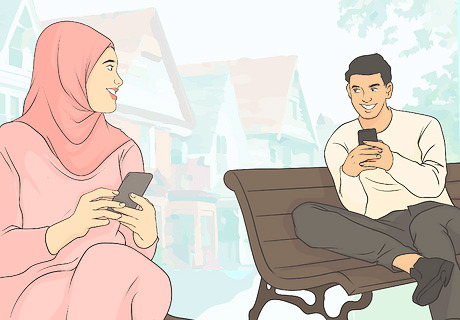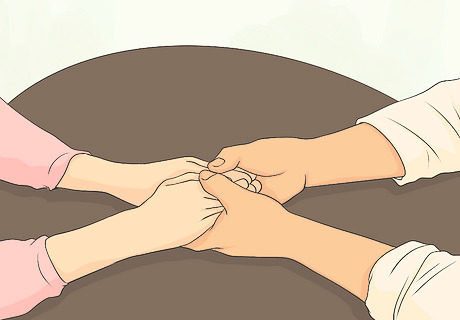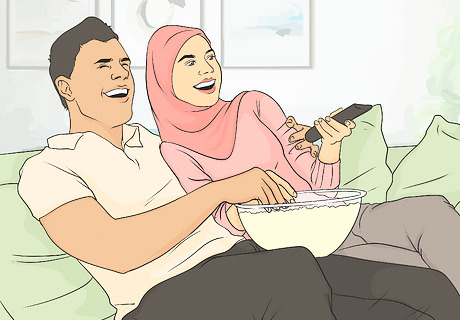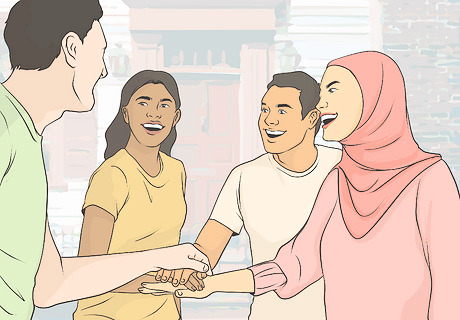
views
Getting to Know an Introvert

Isolate yourself from larger groups. An introvert is much more likely to respond to your advances if you are not surrounded by your friends. If they are an acquaintance of yours already, ask them to go on a walk, or accompany them on an errand—these types of innocent activities won’t seem too pushy, and will give you time to display your interest in a more intimate setting. If you don’t know them very well, try to approach them when they are by themselves, and seem relaxed.

Ask their opinion. Introverts don’t often offer personal information without prompting. Try bringing up a subject that you think they are interested in, or that you really care about. Ask them a few leading questions and chances are good that they’ll open up when given such a direct opportunity to do so. If you aren’t able to draw them out of their shell right away, don’t worry. It takes time and perseverance to date an introvert.

Show your romantic interest with body language. Oftentimes, introverts won’t make the first move because they will be busy over-thinking the situation, or weighing-in other factors. You, however, can make your interest and intentions crystal clear by using the right body language. Maintain eye contact for slightly longer than you would normally, or try catching their eye in a group conversation when neither of you is speaking. Briefly touch their upper arm or knee while you are in one-on-one conversations. Graze their shoulder or upper back with your hand when you approach them in a crowded place.

Start a conversation on common ground. An introvert will respond to your advances a lot faster if you have something in common to discuss. This is because you can jump straight to the heart of the matter (their preferred mode of communication), rather than slogging through small-talk to discover what you both have in common. Find out what they like to do, or where they hang out. If you have friends in common, ask them. Don’t pretend to be interested in something just because they are.
Spending Time with an Introvert

Try doing quiet activities together. An introvert needs to re-charge their social energy fairly often. In order to spend the time you want to with your partner or potential partner, you may need to engage in quiet or separate activities side-by-side. Watching a movie is a good example of this. You can spend quality time together without stressing your introvert. When the movie is over, discuss it at their leisure.

Give your partner alone time during long periods of socializing. Your partner will probably need to slip away from a party or group setting every so often to recharge. Oftentimes, even a ten-minute break break from large gatherings, public spaces, or rambunctious activities will be enough for an introvert to bounce back into the action. Don’t interrupt their alone time. Instead, trust that they will come back when they are ready.

Attend smaller functions. Instead of a large dinner party or gala, invite one or two other friends over to your house. Introverts thrive in one-on-one settings and small gatherings, which give them a chance to make personalized connections and be heard over the din of extroverted group settings.

Avoid loud, crowded places. Introverts can become over-stimulated when faced with boisterous and bustling environments. They may seem distant, aloof, or distracted, but this is because they are trying to cope with external stimuli, rather than being able to focus solely on you. If you notice your introvert making less eye contact, gazing into the distance, or not responding in group discussions, ask them if they are uncomfortable or want a break.

Actively engage an introvert in a group discussion. Introverts tend to space out, or disengage in group discussions or functions. Try asking them a question directly, to bring them back into the group. They will appreciate your directness, and the thought that you want them to feel included.
Communicating with an Introvert

Avoid questions with "yes" or "no" answers. Try to get the person to open up a little with questions that begin: “how do you feel about—,” “why do you think—,” or “what do you think about this—.” Leading questions like these will assure your introverted partner that they have space to go in depth with their answer, and are more likely to spark a rewarding conversation for both of you. Some introverts are animated with certain people that they know, while others will seem consistently aloof. If someone repeatedly answers your questions with a simple “yes” or “no,” take it as a cue to give them some space.

Pay attention to their facial expressions and body language. Introverts will not always say what they are thinking. You’ll need to be especially observant to understand how they are feeling if they do not verbalize it to you without prompting. A small, coy smile is a positive indicator. A small, forced smile may be a sign to back off. If their arms are folded across their chest, they may not be in the mood to talk to anyone. If they adjust their posture or position to mirror yours, it means that they are focused on you and feeling engaged.

Avoid excessive compliments. Introverts tend to dislike being the center of attention, and over-complimenting someone draws a lot of attention to their body and personality. So, take it easy and say what feels natural, rather than overwhelming your date with forced, expected, or stock compliments. Try: “I really like the knit in your sweater—is it Gaelic?” instead of: “I could spend a thousand hours staring into your ravishing eyes.”

Talk with depth as well as breadth. Introverts hate small talk, and will react much more positively to a conversation that has some depth or personal connection to you. For instance, rather than discussing the whole week’s weather, tell them what the thunder storm last night reminded you of in particular. Don’t be afraid to range over a topic or two, but remember that they will open up more if you offer a specific and meaningful conversation starter.




















Comments
0 comment